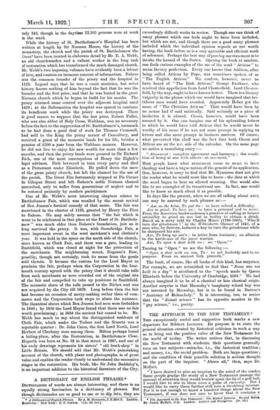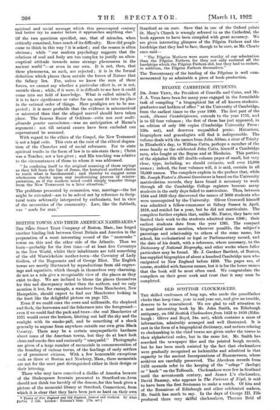THE APPROACH TO THE NEW TESTAMENT.* Tins exceptionally useful and
suggestive book marks a new departure for Hibbert Lectures. Its purpose is to state the general situation created by historical criticism in such a way as to bring out the positive value of the New Testament for the world of to-day. The writer notices that, in discussing the New Testament with students, their questions generally turn on two subjects—miracles, i.e., the historical tradition ; and money, i.e., the social problem. Both are large questions ; and the condition of their possible solution is serious thought on the part of the inquirer. "Above all," then, says Dr. Moffatt,
"-I have desired to give an impetus to the mind of the reader. Some people grudge the study of a New Testament passage the amount of attention they would bestow upon the lie of a golf ball. I would like to stir in them even a pulse of curiosity. But I would like to carry them further still into a throbbing interest. For it is not enough to know a hundred things about the New Testament, if one does not care to know that it contains a • The Approach to the Nem Tenanted : The lltithert—Ledwree. Send Berke. By James Moffatt. D.D. London : Hodder and Stoughton. 18s. Od.1 spiritual and social message which this preoccupied century had better try to master before it approaches anything else."
Of the two questions specified, one, that of miracles, when critically examined, loses much of its difficulty. How did people come to think in this way ? it is asked ; and the reason is often obvious ; while "our modern psychology suggests that the relations of soul and body are too complex to justify an ultra.
sceptical attitude towards some strange phenomena in the ancient world "—or even in our own. It is not, then, that these phenomena, as such, are rejected ; it is in the formal definition which places them outside the forces of Nature that the fallacy lies. For, unless we know the sum of these forces, we cannot say whether a particular effect is, or is not, outside them ; while, if it were, it is difficult to see how it could come into our field of knowledge. What is called miracle, if it is to have significance or value for us, must fit into its place
in the rational order of things. Mere prodigies are to be sus- pected ; it is more probable that the evidence is misconceived or misstated than that the alleged marvel should have taken place. The famous Razor of Ockham—critia non aunt multi- plicanda praeter necessitatem—was an anticipation of Hume's argument : not till natural causes have been excluded can supernatural be assumed.
With regard to the ethics of the Gospel, the New Testament is not a legal code. This cuts at the root of the ethical dogma- tism of the Churches and of social reformers. For to state spiritual truths in the form of law is to mis-state them ; Christ was a Teacher, not a Jaw-giver; and His teaching was relative to the circumstances of those to whom it was addressed.
"In confining itself to the original meaning of these sayings as they fell from the lips of Jesus, the historical method claims to reach what is fundamental ; and thereby to suggest some wholesome checks upon any modernizing process of reinter- pretation, as if the modern mind could simply transfer things from the New Testament to a later situation."
The problems presented by economics, war, marriage—the list might be extended—are to be solved not by reference to Scrip- tural texts arbitrarily interpreted by enthusiasts, but in view of the necessities of the community. Law, like the Sabbath, was "made for man."



































 Previous page
Previous page